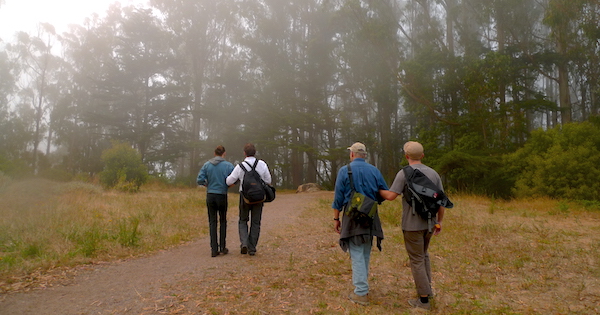I have always been fascinated by songs that sound alike. I love the kind of artists’ mindmeld that happens when multiple songs released around the same time converge in similar sound. I love when musicians pay homage to their favorite influences. I love trying to pick out samples in songs. And I love the gossipy scandal of blatant rip-offs.
So I’m sure you can imagine my intrigue when it came out a few weeks ago that Tom Petty had mysteriously been added as a listed author on Sam Smith’s hit “Stay with Me” — a song he ostensibly had nothing to do with.
In case you haven’t been following this story with my same childlike relish, here’s what happened: Sam Smith released “Stay with Me” on April 14, 2014. The song went on to hit number two on the Billboard Hot 100 and earned Smith Grammys for “Record of the Year” and “Song of the Year” earlier this month. Shortly after the song’s release, murmurs started floating around the music industry of the similarities between the melody and that of Tom Petty’s 1989 classic “I Won’t Back Down.”
“Tom Petty had mysteriously been added as an author on Sam Smith’s hit ‘Stay with Me’ — a song he ostensibly had nothing to do with.”
Details on this next step are unclear, but sometime last fall, Petty’s publishers approached Smith’s publishers about those similarities and in October an agreement had been negotiated granting Petty and his co-author Jeff Lynne 12.5% of the writing credits on “Stay with Me.”
The settlement remained completely out of the press until shortly before the Grammys, when journalists at The Sun revisited the song’s production credits in the lead up the the awards. They found that Petty and Lynne were suddenly co-writers, leading both parties to make public statements, which you can read here and here.
What caught my attention in the statements is that both parties seem to be acting so genuinely nice and understanding towards each other about the incident. Petty expressed surprise that the news had even surfaced and said in his many years as a songwriter, he’s come to understand that it’s just one of those things that can happen. Smith noted that he counts Petty among his influences, though he wasn’t particularly familiar with “I Won’t Back Down.” And that he readily acknowledged there were similarities in the two songs but claimed they were completely coincidental and unconscious on his part.
So then how did it happen?
Many were quick to note that there are only so many possible melodies available in rock music. The webseries V-Sauce put together an incredible exploration of how true that particular assertion is. Their ultimate conclusion is that no, we aren’t running out of possible musical combinations, but here’s the key message: “Even though the number of possible different melodies is gigantic, us humans tend to gravitate towards certain patterns that we like more than others. And we are influenced by what comes before us.”
That phenomenon narrows music down even further when you consider genre. In pop music, there are a small number of chord progressions that show up again and again. This is a topic we could explore in depth (shameless self-promotion: and indeed we do in our upcoming Building Blocks of Piano course, launching March 2nd!) but I doubt anyone can cover it as well as The Axis of Awesome in “4 Chords.”
The fact that there is a sort of collective memory at work in songwriting is one viable factor here. But the melodies of the two songs are just too similar for this to have been pure coincidence. If you sing the titles of each song, you are singing the same tune.
Which brings me to the explanation I find most intriguing: that Smith had over the years heard Petty’s song in passing, it got stuck in his head and turned over often enough that through the fallibility of memory, eventually he thought the core, five-note melody was his own invention.
“Earworms” represent a very effortless and veridical form of memory.
There are a few elements to this hypothesis. The first is the concept of a song getting stuck in your head — an experience so common there’s actually a word for it, “earworm.” Psychologist Vicky Williamson calls earworms “a very effortless form of memory,” and “very veridical, meaning it’s a very good representation of the original tune.”
In This Is Your Brain on Music, author and professor Daniel Levitin says that earworm attacks are usually based around the hook of a song, and are equal to or less than the capacity of your auditory short-term memory, or roughly 15-30 seconds. And studies point to earworms happening more often to musicians.
Listening to music triggers the auditory cortex and researchers are exploring the link between the auditory cortex and memory for it’s ability to trigger unusually quick and precise recall. In one study, familiar songs were played for participants inside of an MRI machine and then unexpectedly cut off mid-chorus. Looking at the brain, the auditory cortex continued “singing”, showing that the brain was recalling the song from memory and singing along as the music played and continued even after the song cut of.
Which all means that it’s entirely possible that Smith had heard “I Won’t Back Down” in passing over the years and remembered it in the passive, effortless way music memories are formed, even though he never actively engaged with with the song.
But this happened nearly a month ago. Why am I talking about it now? This leads me into the second element of my hypothesis — that while musical memories are uniquely veridical, the same cannot be said of the rest of our memories, as Brian Williams can attest.
Anchorman Brian Williams has spent the last two weeks on the opposite side of the news due to the changing accounts he’s given of his experience in Iraq in 2003. Confronted with clear evidence that the version of events from his trip was categorically incorrect, Williams has thrown his own brain under the bus, saying that he “misremembered” what happened.
“It is absolutely possible to change memories, replace memories, or even implant entirely new memories of experiences you never had.”
Again, I’m asking you the reader to give the benefit of doubt to the accused. If we believe that Williams did not intend to mislead the public, is it possible to rewrite the memory of something you yourself experienced?
On this topic, the science seems to agree. It is absolutely possible to change memories, replace memories, or even implant entirely new memories of experiences you never had. Maria Konnikova summed up a huge amount of the relevant research in her New Yorker piece “You Have No Idea What Happened.”
To me, the most interesting of the psychological explanations to be brought up during the debate is the “fuzzy-trace theory.” Fuzzy-trace explains the way memories are recorded and retrieved, positing that both happen through two simultaneous processes that allow for memories to be rewritten every time they are recalled, so that over time, in the course of re-remembering and re-telling a story, that story can be entirely overwritten by a completely different series of events.
What’s more, many studies have shown there is absolutely no correlation between how confident you are in a particular memory’s veracity and the truth of what actually happened. In one example, on the day after the Space Shuttle Challenger explosion a psychology professor gave his class a questionnaire to fill out about where they were when they heard what had happened. Two years later he gave the same group the same questionnaire. The average student scored below 50%, meaning most of their memories of the day had been fabricated after the fact. One quarter of students scored zero. Meanwhile, when asked how confident they were in their answers, the class average was 4.17/5.
Based on the research, the more we revisit a memory, the more it changes. And what requires more re-telling than the process of songwriting? You are playing the same progressions over and over again, writing a core melody, building verses around it, adding instrumentation, lyrics, vocals, practicing what you’ve written. And with so many opportunities to rethink a memory, particularly such a passively-acquired memory, it makes perfect sense to me that the kernel of inspiration could quickly be lost to the process of building a song around it.
“If all else fails, write another version of ‘I Won’t Back Down.’ People will write articles about you, you’ll win Grammys, and it’ll sound great!”
Then what does all this mean for musicians and songwriters? Happily there are abundant lessons to be taken from both stories: Know that your memory is flawed. Know that you are a product of your environment and that inspiration doesn’t come in a bubble. Acknowledge and celebrate your influences, they’ve made you who you are. Work hard to write something totally new. And if all else fails, write another version of “I Won’t Back Down.” People will write articles about you, you’ll win Grammys, and it’ll sound great! Just call it an homage from the outset and avoid all the legal fees.
So there you have it, my interpretation of the Sam Smith–Tom Petty scandal. Don’t agree with me? I’m always ready to hear salacious new gossip, hair-brained conspiracy theories, reasoned rebuttals, cognitive science, and personal takedowns (of Sam Smith, not me!). Leave your thoughts in the comments below!



